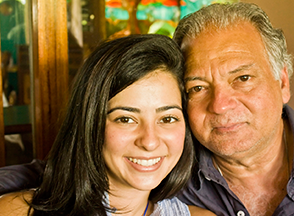Lesbian, Gay, Bisexual, Transgender and Questioning Teens: Tips for Parents

As parents, we want nothing more than for our children to be happy, healthy, and safe. Most of us also have dreams and fantasies of how our children’s future romantic lives will turn out. For instance, perhaps we have visions of our daughter on the arm of a handsome boy at prom. Or we may assume that day our son will marry a wonderful girl and have beautiful grandchildren.
So when a child or teen reveals that he or she is or may be gay, lesbian, bisexual, or transgender, it can be disorienting, surprising, or upsetting for some moms and dads. Even parents who feel very supportive may still worry that their child’s future will be difficult, or that he or she wil face obstacles or hard times.
Accept Your Child
Although this time may be challenging for some parents, it’s extremely important to be supportive and accepting of your child. Your reaction matters. LGBT youth whose parents reject their identity are more likely to be depressed, use alcohol and illegal drugs, have unprotected sex, and even attempt or commit suicide. Meanwhile, LGBT youth whose parents accept them experience much better mental and physical health, as well as increased happiness and well-being.
So offer your beloved child your love and acceptance above all. Encourage him or her to talk about these feelings, which may be bewildering or tentative at first. Let your child know that it’s normal if they feel unsure or confused, and that they have as much time as they need to figure things out. (Some kids and teens who experience feelings of same-sex attraction or who have same-sex experiences may not go on to identify as LGBT.) On the other hand, if your child does feel sure, don’t question these feelings or try to talk him or her out of it.
Look for Support
As for you (and your spouse, coparent, or partner), take time to learn about parenting an LGBT child and to reach out for connection and support, if needed. Groups like PFLAG or a local Gay-Straight Alliance can help you and your child find a community where all of you will feel accepted and supported. You may be able to find events through these groups where your teen can meet other LGBT or questioning teens to socialize.
Check in About School
You may also want to look into the climate for LGBT students at your child’s school and find out if there is a club to support LGBT youth there. (But remember never to “out” your child or teen to others without his or her permission.) Keep lines of communication open with your child regarding school climate and any orientation-related bullying he or she may experience, as this can be damaging to his or her mental health.
Reaching Out
For some families, it may also be useful to seek supportive counseling for your child or yourself to handle any emotional concerns associated with these issues. If your child or teen identifies as transgender, you may wish to talk to psychologists and medical professionals about the possibility of socially transitioning to the gender with which they identify.
One thing that’s very important to know is that experts strongly recommend against pursuing any type of therapy aimed at changing your child’s gender identity or sexual orientation (often called “reparative” or “conversion” therapy). The American Psychological Association (and many other professional groups) has taken an official stance against reparative therapy, stating that it is ineffective and unsafe, and it is illegal for minors in some states.
Talk about Sex and Dating
Finally, don’t forget to keep communication open about sex and dating. Multiple studies show that teens want and need their parents to discuss these topics with them, and LGBT teens are no exception. Just like heterosexual teens, they need to know about healthy dating, your values on sexual activity, and safer sex.
A teen who is identifying as LGBT or questioning his or her sexual identity needs the loving support of parents and will benefit from your active involvement in their lives. While issues of dating and sexuality may be somewhat different than those experienced by heterosexual teens, there will also be similarities. You can be there for your teen.
Strengthen Your Parenting Skills in Our Free Relationship Classes
Looking for a little help with the challenges of parenting? SMART Couples project is offering ELEVATE, a fun, FREE, research-backed relationship enhancement class for couples, in 5 Florida counties. The course covers parenting as well as general relationship skills. Learn more!
By Carol Church, lead writer, SMART Couples, Department of Family, Youth and Community Sciences, University of Florida
References
Centers for Disease Control. (2013). Parents’ influence on the health of lesbian, gay and bisexual teens : What parents and families should know. Retrieved from http://www.cdc.gov/healthyyouth/protective/pdf/parents_influence_lgb.pdf
HealthyChildren.org. (2015). Gay, lesbian, and bisexual teens: Facts for teens and their parents. Retrieved from https://www.healthychildren.org/English/ages-stages/teen/dating-sex/Pages/Gay-Lesbian-and-Bisexual-Teens-Facts-for-Teens-and-Their-Parents.aspx
Maurer, L. (n.d.) Ten tips for parents of a gay, lesbian, bisexual, or transgender child. Retrieved from http://www.advocatesforyouth.org/parents/173?task=view
Substance Abuse and Mental Health Services Administration. (2014.) A practitioner’s resource guide: helping families to support their LGBT children. HHS Publication No. PEP14-LGBTKIDS. Rockville, MD: Substance Abuse and Mental Health Services Administration. Retrieved from https://store.samhsa.gov/product/A-Practitioner-s-Resource-Guide-Helping-Families-to-Support-Their-LGBT-Children/PEP14-LGBTKIDS
Youth.gov. (2011). LGBT. Retrieved from http://youth.gov/youth-topics/lgbtq-youth
Return to Topic: Teen Dating: What Parents Should Know

